Follow the link for more information on the funding opportunities available within the area of Facilitating EU transnational tourism.
Deadline for submission: 15/01/2015.
Please contact your Funding Development Officer for further information.
Latest research and knowledge exchange news at Bournemouth University
Follow the link for more information on the funding opportunities available within the area of Facilitating EU transnational tourism.
Deadline for submission: 15/01/2015.
Please contact your Funding Development Officer for further information.

Follow the link for more information on the funding opportunities available within the area of Promoting the contribution of private savings to pension adequacy. Limited time left to apply so if this area is of interest to you then please take a look. Deadline for submission: 23/12/2014.
Please contact your Funding Development Officer for further information.
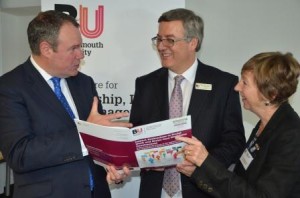
A centre to provide leadership and management development opportunities and support across the health and social care sector has been launched at BU.
The Centre for Leadership, Impact and Management in Bournemouth (CLiMB) offers a range of development options – including leadership and management programmes; coaching and mentoring development; accreditation for in-house programmes; and consultancy, research and impact evaluation.
Director of CLiMB Professor Keith Brown said: “CLiMB is being launched to bring together Bournemouth University’s strengths of research, consultancy and education in the leadership of health and social care services. “Never before have these services been under the level of financial pressure and public scrutiny that they are currently, coupled with increasingly high public expectations for quality services. “These needs and demands can only be met by better leadership at all levels within the health and social care sector.”
The centre has been launched after more than five years of research and development in the field of leadership and management in health and social care. Professor Brown was asked by the government’s Social Work Reform Board, established following the death of Peter Connelly, to develop a leadership pathway for social work managers.
This was extensively evaluated for impact and then adapted for healthcare in response to the Francis report at Mid Staffordshire Hospital.
The Centre was officially opened on 12th November by Bournemouth West MP Conor Burns, who said: “Too often in health and social work, organisations have become too immersed in process and procedure that they lose sight sometimes of the outcome. We should be proud of what Keith and the team do in terms of outcomes for people… making a contribution emotionally and economically.”
Sue Sutherland OBE, Chair of BU’s Board and former Chief Executive of Poole Hospital, said: “The launch of this centre is really important. It is absolutely rising to the challenges that the sector faces, helping to develop the best health and social care service that’s borne out of leadership at every point of the sector.”
CLiMB currently receives HEIF funding. Higher Education Innovation Funding aims to support and develop a broad range of knowledge-based interactions between universities and colleges and the wider world, which result in economic and social benefit to the UK.
The Knowledge Transfer Network are running an information day and workshop around User Experience and Data technology innovation. This event will bring together businesses, academics and researchers working within UX and data to contribute to a discussion on the scoping of a Spring 2015 funding competition.
Innovate UK (formally Technology Strategy Board) will be running three funding competitions in areas relating to User Experience (UX). This event is an opportunity to learn more about these funding calls, how to apply as well as influencing future activities in UX.
There are two themes to these UX related competitions:
1. Utilising personal data to improve a user’s experience of a product or service: This competition is a feasibility study and is due to launch in March 2015. There will be an opportunity to influence the scope of this call so that it correctly addresses the issues that are affecting the UX industry.
2. Innovative technology & software to improved the interaction between human and machine: This will focus on novel approaches to UX with an innovative software element to them, essentially how to let people and machines interact better, moving beyond the traditional keyboard, mouse and screen.
There are two competions in this theme: a feasibility study and a Knowledge Transfer Parnership. (KTP).
Date: Tuesday, 02 December 2014
Time: 10:30 – 16:30
Venue: Barbican Centre, London
Thinking of a fantastic event idea aimed at the younger generation can be challenging. It can often be very helpful when the audience we are aiming at can give us inspiration, a great event idea for the younger generation came from an audience member at the last Café Scientifque.
Have you thought about running a child friendly forensics event at the 2015 Festival of Learning? This idea will create a hands on, entertaining and memorable day for children attending the festival and has also worked extremely well in previous years.
Incidentally, if you wish to gain inspiration in running this event idea, the next Café Scientifique will be looking at ‘Who Stole Christmas’ with a forensic themed talk in store on the 2nd December so be sure to mark the date in your diary.
Or perhaps you may be inspired to run a child friendly event in storytelling. Events with this theme have worked well in previous years with strong turn outs and positive feedback from attendees. This could really get a child’s imagination going and inspire them to improve their storytelling skills.
Now is a great time to start thinking about your event in order to get your proposal in for the 19th December deadline.
If you would like to get involved in the Festival of Learning in 2015, you can submit your proposal here or contact Naomi Kay to discuss how your research can translate into a memorable Festival of Learning event.
Dr. Miguel Moital, Senior Lecturer in Events Management in the School of Tourism, has been invited by Kazakhstan’s National Center of Science and Technology Evaluation (NCSTE) to review research proposals submitted as part of the call for grant funding 2015-2017. The Center, created in 2011, is responsible for organizing and conducting the evaluation of research proposals by Kazakhstani academics. Miguel reviewed proposals in the areas of tourism and events.
Commenting on the experience, Miguel said ‘I found the exercise a good learning experience about Kazakhstan and the research projects being developed in the country in the areas of tourism and events. I have visited the Central Asian region before (Turkmenistan) and I am fascinated by how quickly the region is changing and developing. There is a vibrant research environment in Kazakhstan after the President decided to allocate 3% of the budget to science. The latest call attracted 5000 proposals on all areas, with tourism and events ones increasing significantly when compared to the previous call.”
 Staff and students are invited to join us for the next cyber security seminar on:
Staff and students are invited to join us for the next cyber security seminar on:
‘Secure and cross border digital identity: issues and perspectives’
Tuesday 25th November, 4pm – 5pm
Room: P335
The talk will discuss requirements, issues and perspectives for an interoperability solution that allows citizens and organizations to establish new e-relations across borders, just by presenting their national eID.
Our speaker will be Dr Andrea Atzeni, from the “Dipartimento di Automatica e Informatica, Politecnico di Torino” who is based in the TORSEC Security group.
Dr Atzeni’s work addresses the definition of security requirements and mobile security, plus, investigation and modelisation of user expectation on security and privacy; risk analysis and threat modeling for complex cross-domain systems; specification of functional and security architectures; development of cross-domain usable security; development and integration of cross-border authentication mechanisms (including legal and technical issues).
The impact of a collaborative research project between the Media School, the School of Health and Social Care, and Victoria Education Centre in Poole, was showcased on ITV Meridian early evening news on Thursday Oct 2nd.
The five-minute film followed Dave Young’s story. Dave participated in the first two phases of the ‘Seen but Seldom Heard’ project aimed at challenging dominant perceptions of disability through poetry and performance. Dave is now putting into action what he learned in order to launch his own campaign – ‘Don’t Write Me Off’, to raise awareness of disability (in particular, Cerebral Palsy) through performance poetry and other creative arts.
The short film can be viewed here:
http://www.fixers.org.uk/news/10702-11208/mute-not-dumb-fix-on-itv.php
To find out more about the Seen but Seldom Heard project visit: http://microsites.bournemouth.ac.uk/seen-but-seldom-heard/
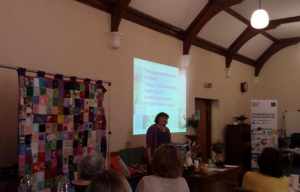 On 5th November Jenny Hall, Senior Midwifery Lecturer, presented at an event organised for the ‘Thinking Futures’ festival for the University of Bristol. http://www.bristol.ac.uk/fssl/festival/
On 5th November Jenny Hall, Senior Midwifery Lecturer, presented at an event organised for the ‘Thinking Futures’ festival for the University of Bristol. http://www.bristol.ac.uk/fssl/festival/
The festival was an eleven day series of lectures to share and celebrate research from the Faculty of Social science and Law and had sponsorship from the ESRC Festival of social science. The sponsorship meant that it was open to the public and therefore anyone could turn up.
The day was called ‘Patchwork, quilting and keeping it all going’ and arranged by inspirational Management academic and quilt researcher Ann Rippin http://annjrippin.wordpress.com/ Ann placed in social and historical context the study of quilting and the history of quilters, identifying the lack of research around this significant social activity. Harriett Shortt from the business school at UWE Bristol shared how she had developed a quilt as a response to her PhD studies.
http://harrietshortt.wordpress.com/ Jenny also talked about the process of reflexivity in her EdD study around developing her quilt as well as the creation of ‘text quilts’. The audience included researchers as well as members of the public active in stitching. Overall it was a day that stimulated a lot of discussion around the use of creative craft in life as well as research and highlighted the need for more work around quilters to be carried out.
Academics from Erasmus University, Rotterdam, the Netherlands joined fellow researchers at Bournemouth University for a two day workshop on November 6-7. The workshop focused on organizational behaviour and legal development.
Presentations ranged from examining corruption in terms of foreign owned firms paying bribes and organizational wrong doing to legal issues involving IP issues and trademark violations at the London Olympics.
Bournemouth University PhD candidate, Nick Coppola, presented his paper “EU competence in IP matters: the strange case of geographical indications”. Coppola’s presentation explored the division of competencies between the European Union and its member states with regards to an often controversial form of intellectual property.
“I am presenting this paper again to the Italian Association of Agricultural Lawyers November 27 in Rovigo, Italy, so the opportunity to get feedback from colleagues in a smaller forum prior to the conference will help me to respond to potentially difficult questions from subject matter experts,” said Coppola. “Additionally, it was a good opportunity to discuss my paper with professors and peers who take a different approach to law. This has helped me to consider my research from an alternative perspective.”
Legal issues were further addressed when Dr. Lingling Wei presented her joint paper with Erikson about the event specific legislation for mega sporting events. Their paper intersects social sciences discussions with legal analysis.
“I think these interdisciplinary research workshops are a good way to work outside of the restriction of the legal field and have a good interaction with the social scientist,” added Wei.
Organizational behaviour was also explored at the workshop. Erasmus University Rotterdam candidate, Shaheen Naseer, presented her paper “Bureaucratic power and corruption, Imprinting of the past” which gave a contextual overview of how Pakistan’s bureaucracy has been influenced during its time as a British colony.
“The conference was a great opportunity for me to interact with academics from diverse backgrounds,” said Naseer. “The papers were at the forefront of knowledge and the floor discussions helped cross-fertilization of ideas. The conference was held in an atmosphere of collegiality and I enjoyed the great hospitality of the organizers”
Dr. Fabian Homberg, Bournemouth University and Prof. Klaus Heine, Erasmus School of Law, have started these workshops in 2011 as an informal way to foster intellectual exchange and to develop interdisciplinary research projects. This initiative will continue in the future and has also resulted in an ERASMUS+ Agreement between BU’s Business School and Erasmus School of Law which is active since the start of this academic year (2014/2015). This means exchange opportunities for undergraduates, post-graduates and post-graduate researchers and staff are now available between these two institutions.
In Dorset, we are blessed with a fantastic environment full of fascinating features. Could your Festival of Learning event by inspired by Dorset’s famous coast line?
In previous years at the Festival of Learning, we’ve had informative instruction on how to build the perfect sandcastle and a time walkers’ archaeological walk over Hengistbury Head.
Paola Palma along with representatives from BU’s Bio-beach project, the Nautical Archaeology Society, Poole Maritime Trust, with Maritime Archaeology in Dorset have previously run a Festival of Maritime Archaeology which included activities such as maritime archaeology surveying, excavations in fish tanks and artefact painting, model making and boat building for children
Whatever you decide to do, we know the seaside is a topic which really gets the imagination going. So whether you want to run an event on why chips taste better when they are eaten on the beach, or a workshop on the secret life of sand dunes, start thinking about your event now to get your proposal in for the 19th December deadline.
To get involved in the Festival of Learning, submit a proposal now or contact Naomi Kay to discuss how your research can be the basis of a fantastic Festival of Learning event.
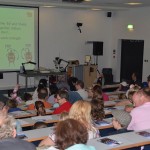
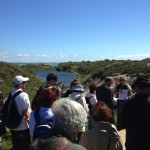

Below are this weeks funding opportunities:
Welcome Trust- Senior Investigator Awards in Biomedical Science.
Senior Investigator Awards support exceptional, world-class researchers, who hold an established academic position. We will support researchers who have an international track-record of significant achievement relative to their career stage, who have demonstrated the originality and impact of their research, and who are leaders in their field.Senior Investigator Awards provide flexible support to enable the best researchers to address the most important questions about health and disease. Awards may be small or large, but candidates must be able to articulate a compelling vision for their research and set out the approaches they will take.
Senior Investigator Awards provide a flexible package of funding that is driven by the requirements of the proposed research. A Senior Investigator Award might be anything up to £425k per year, and for any duration of up to a maximum of seven years. Costs should be suited to and clearly justified by the proposed research and the approaches you will take.
Innovate UK- Innovation Vouchers
An Innovation Voucher gives you up to £5,000 to work with an external expert for the first time. It allows you to gain new knowledge to help your business innovate, develop and grow. That expert help could be advice on a novel idea, on using design within your business or on how to make the most of intellectual property (IP). Our national Innovation Voucher scheme gives you access to a wide range of expert suppliers. They include universities, further education colleges, research and technology organisations, Catapult centres and technical, design and IP consultancies. For instance, equipment.data.ac.uk is an excellent source of advice on university research equipment.
You can apply at any time, with around 100 vouchers being awarded every three months – in October, January, April and July.
The ESRC in partnership with a range of funding partners jointly invites full proposals from eligible research organisations to bid for funding to undertake evidence programmes to underpin a new and independent What Works Centre for Wellbeing.
Interest in wellbeing is growing both nationally and internationally and the UK is regarded as one of the leading countries in this area in terms of measurement, innovative uses of wellbeing data and academics in the field. International focus has been on how societies, governments, communities and populations measure their progress, in more holistic ways – including the UK’s Legatum Institute’s Commission on Wellbeing and Policy. In November 2010, a national ‘measuring wellbeing’ programme was launched by the Office of National Statistics (ONS) driven by public consultation. ONS now publishes regular wellbeing reports and data at a national and local level and has developed a measurement tool for wellbeing comprising 10 domains. A recent All Party Parliamentary Group on Wellbeing Economics has published a report on translating wellbeing evidence into policy, which argues that ‘the time is right to move from national wellbeing measurement to a national wellbeing strategy’.
Proposals are invited for the 2015-16 Advanced Training: Short Courses (ATSC) training initiative. Initiatives funded as part of this scheme must be completed by 31 March 2016.
This call invites proposals offering training initiatives in a variety of forms that fall both within the NERC science remit as well as addressing one or more of the Priority Training Areas contained within the ATSC Announcement of Opportunity document. These training initiatives must prioritise NERC-funded PhD students or develop the skills of environmental sciences early career researchers (working within academic and/or non-academic settings) for future careers in research and other contexts.
NERC has a total budget of £1m for this scheme. The maximum applicants can apply for to run a training initiative is £100k although it is expected that most training initiatives will request £20k-£50k.
The Wellcome Trust is particularly interested in receiving applications from university lecturers within the first five years of their independent research careers. New Investigator Awards are intended to support strong researchers who are in the early stages of their independent research careers and have already shown that they can innovate and drive advances in their field of study. Candidates should be no more than five years from appointment to their first academic position.These Awards provide flexible support at a level and length appropriate to enable the best researchers to address the most important questions about health and disease. Awards may equally be small or large, but candidates should be able to articulate a compelling vision for their research, while ensuring that their proposal and requested funding is appropriate to their research experience to date.
New Investigator Awards provide a flexible package of funding that is driven by the requirements of the proposed research. An award can be worth anything up to £425k per year and for any duration up to a maximum of seven years. Requested costs should be suited to, and clearly justified by, the proposed research, and candidates should ensure that the scope of the proposal and the associated resources are appropriate for their career stage and research experience to date.
The AHRC and BBC Radio 3 are looking for applications for the New Generation Thinkers of 2015. This pioneering scheme aims to develop a new generation of academics who can bring the best of university research and scholarly ideas to a broad audience – through BBC broadcasting. It’s a chance for early career researchers to cultivate the skills to communicate their research findings to those outside the academic community.Each year, up to sixty successful applicants have a chance to develop their programme-making ideas with experienced BBC producers at a series of dedicated workshops and, of these up to ten will become Radio 3’s resident New Generation Thinkers. They will benefit from a unique opportunity to develop their own programmes for BBC Radio 3 and a chance to regularly appear on air.
The aim of the scheme is to provide a development opportunity for early career researchers to cultivate the skills to communicate their research findings to those outside the academic community. The scheme wants to find the new generation of academics who can bring the best of the latest university research and scholarly ideas to a broad audience. Applications should demonstrate an engaging and stimulating programme but also demonstrate an ability to talk about other subjects areas within the arts and humanities in an accessible andrefreshing manner, with awareness of the wider listening audience. We would recommend that you listen to the 2014 winners’ programmes on BBC iPlayer Radio.
RKEO Coffee Morning at the Retreat
The Research and Knowledge Exchange Office will be in the Retreat from 9.30 to 10.30am on Monday, 17th November. Come and meet the team and discuss how we can help you with all aspects of research and knowledge exchange funding.

In November last year I published a blog on the first pilot project I undertook with five under-graduate pre-registration midwifery students which was designed to enable them to qualify with the skills and competencies around examination of the newborn (EXON). The students were required to access and study the module with post-graduate midwives. Four of the students successfully completed the course in September 2014 with one student leaving early on in the project due to unforeseen family circumstances. The journey to completion was not smooth. The first hurdle was a clash of assessments. The EXON assessment (a presentation) fell in the same week as Complex Care (CC), a third year unit assessment where students are required to undergo a VIVA and manage two obstetric emergencies. It is a stressful experience and therefore three of the students requested an extension to their EXON presentation with only one choosing to present with her post-registration colleagues. As the EXON assessment took place on the Monday of that particular week and Complex Care assessments were running over three days, the student managed to negotiate to undertake her CC assessment on the Friday. The three students were re-scheduled to present later in the year with a number of other midwives who were on extensions or resits. One of the advantages of choosing to present in January 2014 was that the student was able to choose a topic that she could use both for her learning around EXON and for her extended essay which was due to be completed somewhat later in the academic year. The student was successful in both endeavours as were all the others but at a later date.
Another hurdle students found themselves confronted with, was a lack of opportunity to undertake newborn examinations including a shortage of midwifery mentors who could support the training requirements of the project. Two of the students could not get any of the examinations done in their own trusts. Fortunately for them, the maternity unit and midwifery staff at Poole NHS Trust Hospital were extremely obliging and supported the students to work there which enabled them to complete the practical newborn checks. All four of the students have successfully qualified as midwives and have obtained midwifery posts in the local area. They remain committed EXON and have volunteered to be EXON ‘champions’ within their respective trusts. I am grateful to Jeanette Elliot, Luzie Schroter, Jenna Penhale and Bex Coleman-Moss for their hard work and dedication during the pilot and for their feedback and advice for the next intake.
Demand for places for the second pilot project remained high when the call was put out a short while ago. Unfortunately due to some of the barriers described above it was only feasible to recruit five students again and all of them based in the west. The students have commenced their studies and are enjoying the learning so far. The pilot projects are helping to inform what impact these barriers will have on the training needs for midwifery students within our local maternity units as this year we are introducing EXON theory to all midwifery students on our newly validated curriculum with the caveat that students will obtain the necessary theoretical knowledge but not all with qualify with the required skills. However by ‘fast-tracking’ students onto one of our twice yearly CPD EXON modules which has around 20+ midwives enrolled, by the time the students reach their third year there should be many more midwives qualified in EXON and in place to support our under-graduate students to gain the competencies around newborn examination. If you require any further information please contact Luisa Cescutti-Butler on lcbutler@bournemouth.ac.uk
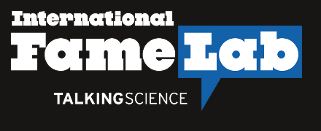
FameLab is the UK’s biggest search for the new voices of science and engineering and sets out to give enthusiastic scientists in the South West area the chance to demonstrate their communication skills. Expect to hear anything from why men have nipples to how cabbages keep warm in winter at this entertaining event.
Contestants will have just three minutes to pitch a concept in science or engineering to the panel of judges. Each judge will assess the finalists’ presentations on three qualities: content, clarity and charisma. If successful in this Bristol-based heat and the following regional final in Cardiff, the lucky winner will then have the chance to take home £1,750 to further their career in the FameLab UK final in London.
The FameLab UK heat in Bristol will take place on 10 December 2014 at 7pm in the rooms of Bristol’s Watershed (http://www.watershed.co.uk/).
Past winners of FameLab such as Maggie Aderin-Pocock, who presented in front of judges including TV presenter and scientist Alice Roberts and palaeontologist Phillip Manning, have gone on to travel the globe, perform at festivals and feature on national TV and radio, and many combine public-facing activity with on-going research. All finalists become part of a global network of science communicators.
FameLab aims to discover charismatic, up-and-coming scientists and engineers who can inspire people to see the world from a new perspective. The competition is the brainchild of The Times Cheltenham Science Festival. In 2014/15 the UK competition is supported by EDF Energy, Haseltine Lake LLP and The Royal Society of Chemistry.
For more information visit http://FameLab.org/uk
To take part visit http://famelab.org/uk/famelab-uk-2015
If you have any questions, please do not hesitate to contact Hanna Goldschmidt, FameLab Assistant (hanna.goldschmidt@cheltenhamfestivals.com ; 01242 537299)
HSC postgraduate student Rachel Arnold just had the first paper from her research in Afghanistan accepted by the scientific journal BJOG. Her paper analyses the culture of a Kabul maternity hospital to understand its impact on the care of perinatal women and their babies. A heavy workload, too many complicated cases and poor staff organisation lead to a low quality of maternity care. Cultural values, social and family pressures influenced the motivation and priorities of healthcare providers.
The centrality of the family and family obligations in Afghan society has emerged as a major theme. Another theme is the struggle for survival – as health care providers work to support their families, to maintain the power that they have, and to survive within a hospital system where fear rather than compassion appears to drive and motivate. Rachel presented some of the key issues at the 2013 GLOW conference in Birmingham. Rachel is supervised by Professors Immy Holloway, Kath Ryan (LaTrobe University, Australia) and Edwin van Teijlingen.
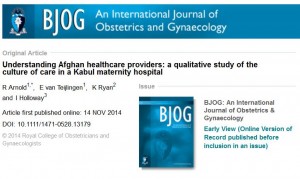
Rachel’s paper Understanding ‘Afghan healthcare providers: a qualitative study of the culture of care in a Kabul maternity hospital’ can be found here. The paper is Gold Open Access.
Prof. Edwin van Teijlingen
Centre for Midwifery, Maternal & Perinatal Health
Monday
Overseas students
Universities minister, Greg Clark, will travel to India next week to sell Britain as the best destination for international students. This follows criticism that Indian students have been put off applying for places. The trip is designed to persuade India’s government and potential students that Britain is anxious to recruit as many overseas students as possible. It follows a fall of around 15 per cent in the number of people from India studying in the UK, which critics believe is due to perceptions of an unwelcoming attitude towards overseas students in the UK as a result of the Government’s clampdown on immigration. Minister Greg Clark to address foreign students’ concerns over ‘unwelcoming’ UK, (The Independent)
More science graduates needed
In a letter to the Telegraph, major employers such as; BAE System, Shell, Nestlé, and Ford said a “fundamental misperception persists” that practical subjects are too difficult and “not relevant” for the majority of school leavers. The letter also argued that whilst significant progress has been made to promote practical subjects in schools and colleges, the UK was still not producing enough graduates and skilled apprentices with a scientific, technology, engineering and mathematical background. Teenagers turned off ‘difficult’ subjects such as science (The Telegraph)
Tuesday
PG Loans
The chair of a consortium of six Russell Group universities, which was given £3m as part of a HEFCE project to widen access to postgraduate education, has said a state loan system won’t help those from less well-off backgrounds. The consortium says scholarships which are joint-funded by; government, institutions and employers would be a better option. Chancellor George Osborne has said there will be an announcement on postgraduate funding in next month’s autumn statement. Six Russell Group universities reject government loans for postgrad study (The Guardian Higher Education Network)
Wednesday
Unpaid internships
Research by the Sutton Trust revealed that a third of university graduates who are employed as interns receive no payment, while paying out up to £926 a month in living costs. They argue that interns who work for more than a month should be paid at least the minimum wage of £6.50 per hour. It is estimated that 21,000 interns are working for nothing in the UK at any one time. Unpaid work costs interns £926 a month – study (The Guardian), Unpaid internships ‘closed to all but the super-rich’ (The Daily Telegraph), Unpaid internships ‘favour the rich’ (BBC News)
Thursday
Student cap
English universities are targeting the European Union for extra student recruitment when the cap on undergraduates is lifted next year, prompting critics to warn about the additional pressure this will have on the student loans system. Recruitment drive for EU students may crash loans system (THE)
USS Pensions
The first sign of a potential thaw in the dispute over pre-1992 university pensions has emerged after the University and College Union put forward proposals accepting the end of the final salary scheme. UCU accepts end to final salary scheme but row over alternative rumbles on (THE)
Friday
EU chief scientist
Leading academics and researchers have condemned the decision to ‘oust’ the chief scientific adviser to the European Commission, Professor Anne Glover, after a lobbying campaign led by Greenpeace. She revealed in an email yesterday to the heads of national science academies that her post had “ceased to exist” and that she would leave the commission in January. Greenpeace and eight other campaign groups wrote to Jean-Claude Juncker, the new commission president, in July urging him to abolish the post because it “concentrates too much influence in one person”. Chief scientist is forced out after green campaign (The Times)
InnovationKT 2015 is an international conference focussing on innovation and knowledge transfer.
InnovationKT 2015 is the conference for knowledge professionals – those academics, business people, managers and researchers working with innovation, enerprise, knowledge transfer, exchange and sharing.
Featuring world-class speakers, oral and poster presentation sessions and interactive workshops, the InnovationKT 2015 Conference will provide an excellent opportunity to disseminate, share and discuss the impact of university-business and business-business interactions. Applicable themes include:-
InnovationKT 2015 will be hosted by the University of Staffordshire on its Stoke-on-Trent campus, and chaired by Dr Matthew Hocking.
Call for papers – click here for more details
Call for proposals for special sessions and workshops – click here for more details
An special session consists of a presentation session of six papers on a specific conference topic, organised as a mini-conference. We invite senior researchers or managers who have a special interest in a specific conference topic to to take responsibility for a special session, gathering papers from colleagues and managing the review process. We also invite proposals for workshops and other activities that will be of interest to delegates.
For more details see the invited sessions page.
InnovationKT2015 is organised by KES International in partnership with the Institute of Knowledge Transfer and the Staffordshire University.
=======
Location
=======
The collaboration between Staffordshire University and UK partners includes
excellent relationships with local and national companies as well as 17 further education
colleges plus charitable organisations such as the Institute for Children, Youth and Mission
and Oasis College.
Staffordshire is world renowned for its pottery and there are many beautiful attractions around
the area where you can immerse yourself in British culture. Take a tour around various pottery
museums, galleries and attractions, maybe visit Stoke Minster and round it off with a nice cup
of English tea at Gladstone Tea Room overlooking their famous cobbled courtyard!
===============
Further information
===============